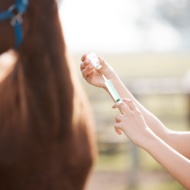Researchers to monitor impact of zinc oxide ban
The researchers hope to address the uncertainties around 'zero zinc'.
A research project that is studying the impact of the ban on giving weaning piglets zinc oxide has received £1.1 million in funding.
The ban has been put in place over concerns that zinc oxide, which is used to suppress post-natal weaning diarrhoea (PWD), may be contributing to the development of antimicrobial resistance (AMR).
The funding has been awarded by the Biotechnology and Biological Sciences Research Council and will help the researchers to assess the impact of the ban on pig health and the development of AMR.
The project, which began in 2022 and is set to run until 2027, will monitor levels of the bacteria which causes PWD in a number of commercial pig herds. The researchers will also analyse the genetic makeup of the bacterial strains, as well as the gut microbiome of the pigs, to assess the impact of the ban on AMR and disease spread.
It is hoped the research might eventually lead to the identification of potential replacements for zinc oxide.
The study is being conducted by a consortium of academics and industry partners led by the Roslin Institute. Researchers from Queen’s University Belfast, the Animal and Plant Health Agency, Scotland’s Rural College, Edinburgh Napier University, and the University of Surrey are taking part.
Deborah Hoyle, a lecturer at the Roslin Institute, said: “This research will provide insights into the effects of the zinc oxide ban but also pave the way for the development of sustainable strategies to manage PWD in pig production systems.
“By addressing the uncertainties surrounding 'zero zinc' and offering evidence-based solutions, we set out to support the pig industry to adapt while maintaining the health and welfare of piglets.”
Image © Shutterstock



 Zoetis UK has apologised for a supply shortage of Equip Artervac, caused by a manufacturing issue.
Zoetis UK has apologised for a supply shortage of Equip Artervac, caused by a manufacturing issue.